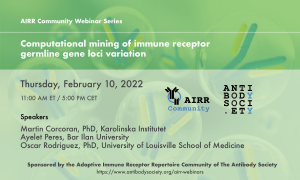 Registration for our next webinar, “Computational mining of immune receptor germline gene loci variation“, is now open!
Registration for our next webinar, “Computational mining of immune receptor germline gene loci variation“, is now open!
B and T cell receptors play a critical role in responding to pathogens and vaccination, and in the pathology of several diseases of the immune system. Gene segments at the T cell receptor and immunoglobulin loci serve as templates for the generation and expression of T and B cell receptors and antibodies. Defining genetic variation within these highly polymorphic loci is critical to furthering our understanding of immunological diseases, and informing the design of vaccines and therapeutics. However, at the genomic level, these loci have been difficult to analyze due to their repetitive nature, rich in segmental duplications, simple repeats and retrotransposon elements. To overcome this complexity, several sequencing technologies and algorithms have been developed to more fully define the spectrum of genetic variation in these immune loci in human populations and other species. This webinar includes demonstrations of three orthogonal and complementary methods. First, Dr. Corcoran will present IgDiscover, an IG and TR adaptive immune repertoire sequencing (AIRR-seq) germline inference tool that has been in use for several years and applied to multiple species. The IgDiscover output is highly reproducible and can facilitate the comparison of multiple individuals in disease cohorts to identify disease associated allelic or structural variants. Ayelet Peres will present on VDJbase and RAbHIT, two bioinformatics tools for germline variation detection from AIRR-seq using population analysis and chromosomal phasing. These tools have been used to discover germline variations affecting the expressed repertoires. Finally, Dr. Rodriguez will demonstrate an approach using long-read sequencing and a bioinformatics tool, IGenotyper, to fully characterize both coding and non-coding single-nucleotide variants, small insertions and deletions, and structural variants across IG and TCR loci in a haplotype-specific manner. This will also include discussion on how IGenotyper is being applied to survey immune loci in non-human species.
Register here!
Tools and Software to be discussed:
- IgDiscover analyzes antibody repertoires and discovers new V genes from high-throughput sequencing reads. Heavy chains, kappa and lambda light chains are supported (to discover VH, VK and VL genes).
- VDJbase.org – a database of adaptive immune receptor genes, genotypes, and haplotypes.
- RAbHIT – R tool for haplotype inference from BCR and TCR repertoires.
- VDJbase pipeline – BCR and TCR repertoires downstream analysis for VDJbase reports.
- IGenotyper (or IG) was developed for PacBio capture data to assemble the Immunoglobulin Heavy Chain locus (IGH), genotype the IGH genes, and identify SNPs, indels and SVs within the IGH locus.

